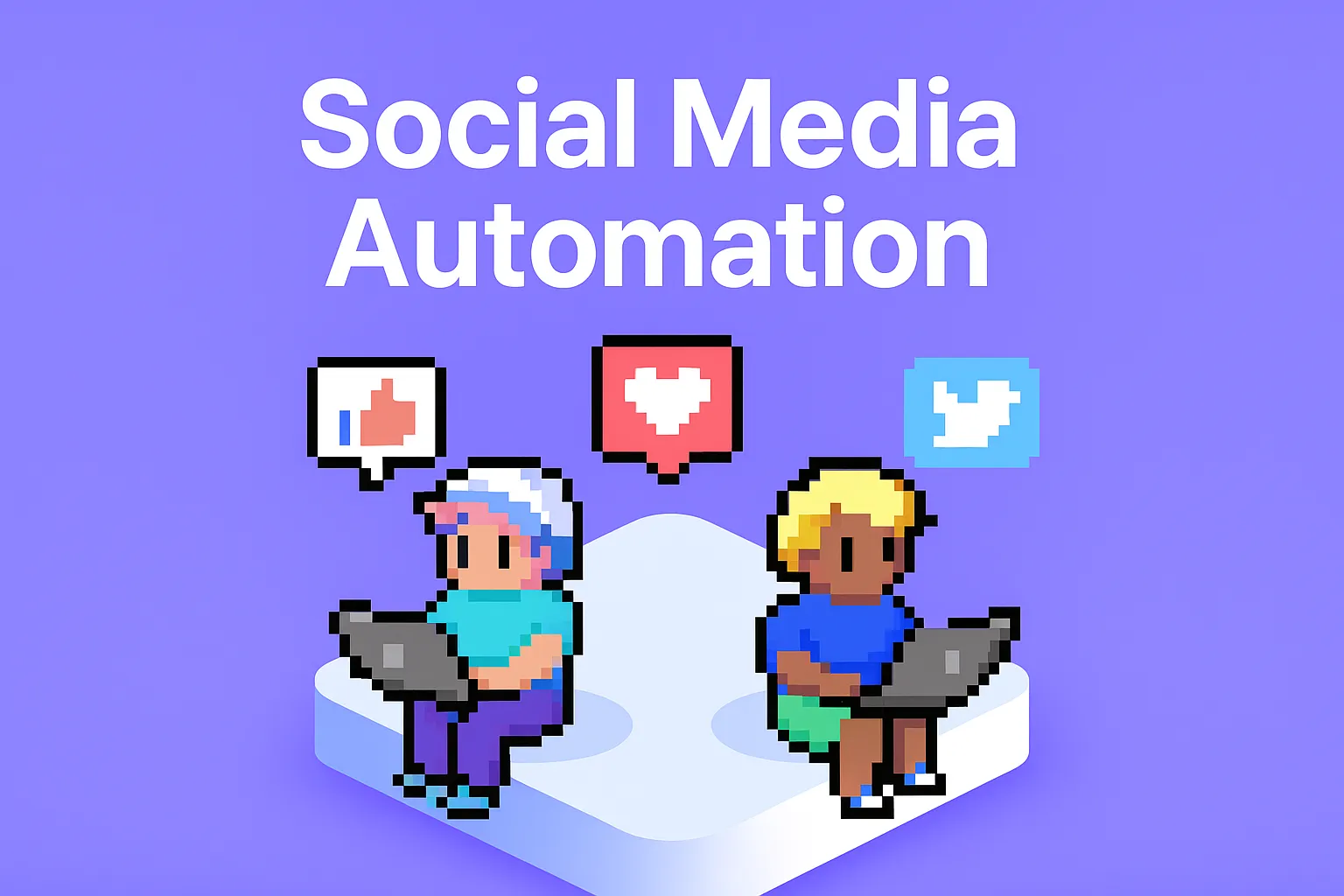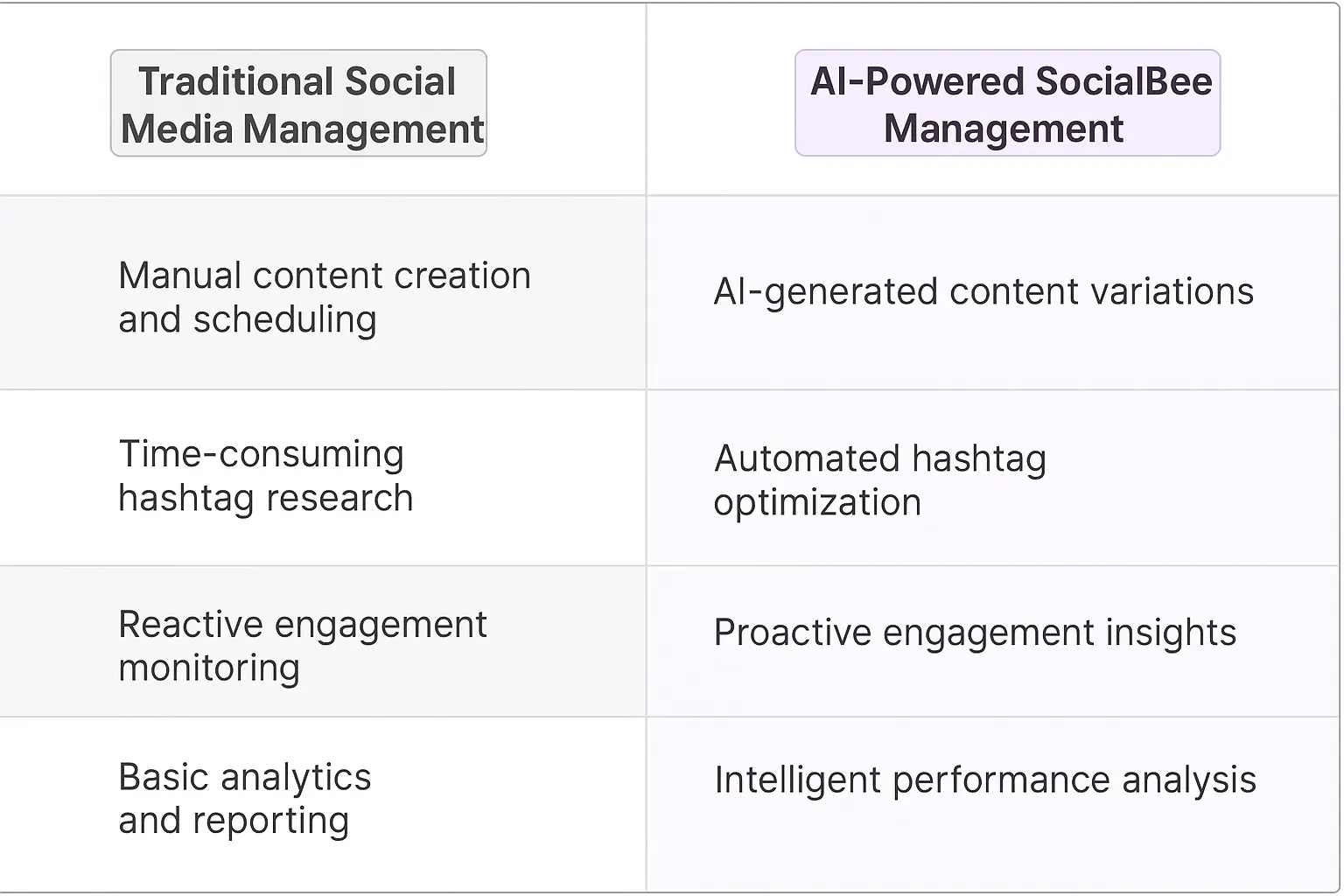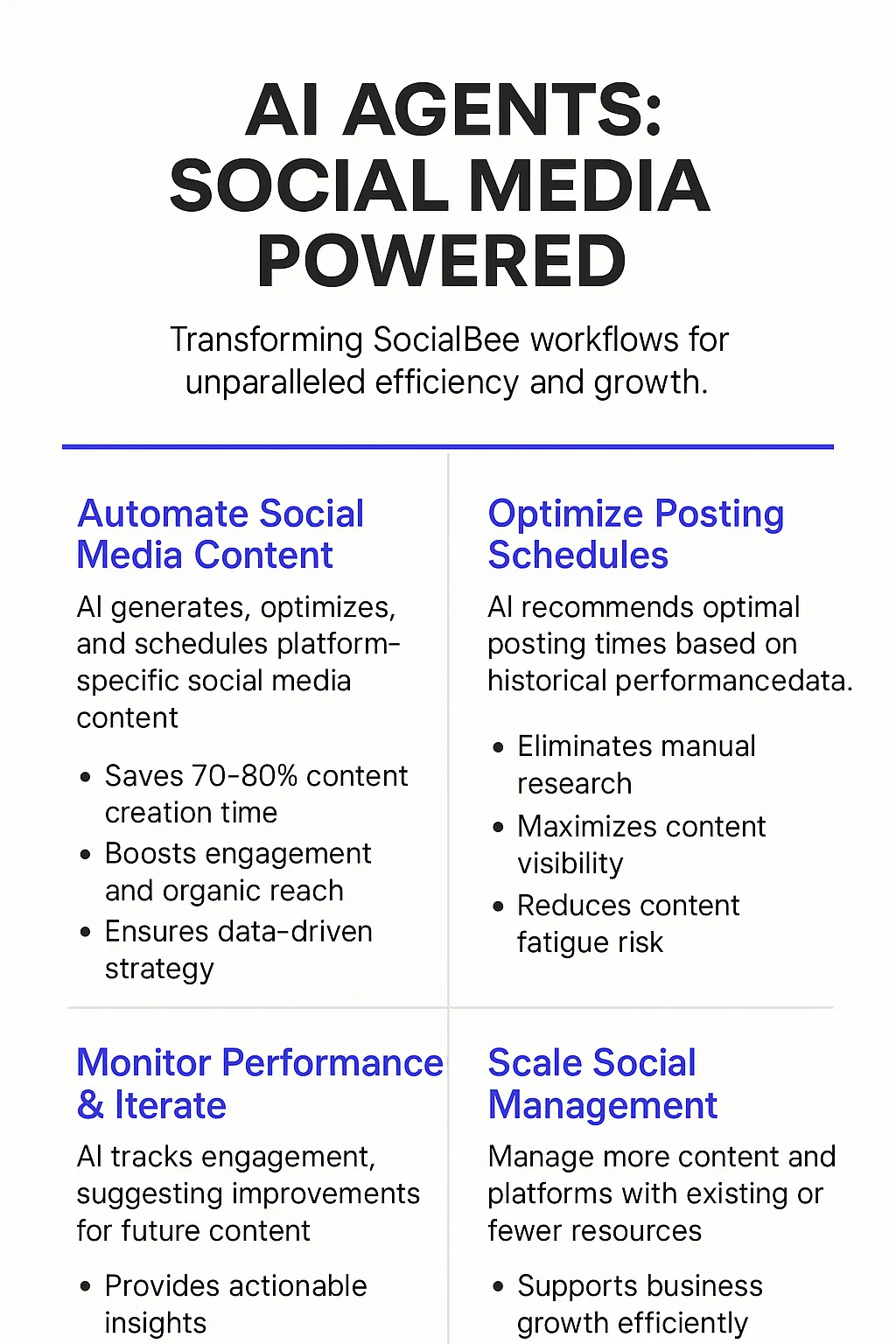SocialBee
Understanding SocialBee's Social Media Management Platform
SocialBee stands out as a comprehensive social media management platform that enables teams to create, schedule, and analyze content across multiple social networks. The platform specializes in category-based content management, allowing organizations to maintain consistent posting schedules while diversifying their content mix. With the integration of AI capabilities, SocialBee has evolved from a scheduling tool into an intelligent content optimization system.
The platform's core strengths include:- Category-based content organization- Multi-platform posting capabilities- Advanced scheduling and recycling options- Analytics and performance tracking- Team collaboration tools- AI-powered content optimization- Custom workspace organization- Brand voice preservation across channels

Benefits of AI Agents for SocialBee
What would have been used before AI Agents?
Social media managers traditionally relied on manual content creation, scheduling, and engagement processes within SocialBee. They spent countless hours writing posts, researching hashtags, and analyzing engagement metrics. The typical workflow involved spreadsheets for content planning, separate tools for image creation, and constant tab-switching between analytics platforms.
What are the benefits of AI Agents?
AI Agents transform SocialBee's capabilities through intelligent automation and content optimization. These digital teammates analyze historical performance data to identify optimal posting times and content themes that resonate with specific audience segments.
The most significant advantage comes from AI-powered content generation. Instead of starting from scratch, social media managers can generate multiple variations of posts tailored to different platforms' unique characteristics. The AI understands the nuances between LinkedIn's professional tone and Instagram's visual-first approach.
Content categorization becomes effortless as AI Agents automatically tag and organize posts based on themes, campaigns, and performance metrics. This systematic approach enables teams to maintain consistent content calendars while experimenting with new formats.
The real game-changer is in engagement optimization. AI Agents continuously learn from audience interactions, adjusting posting schedules and content mix to maximize reach and engagement. They identify trending topics within your industry and suggest relevant content angles before they peak.
For teams managing multiple client accounts, AI Agents maintain distinct brand voices and posting strategies for each profile. They adapt tone, style, and messaging while ensuring compliance with brand guidelines - effectively scaling personalized content creation across accounts.
The network effects are particularly powerful: as more users leverage these AI capabilities, the algorithms become increasingly sophisticated at predicting content performance and audience preferences, creating a flywheel of improving results.

Potential Use Cases of AI Agents with SocialBee
Processes
Social media management through SocialBee becomes significantly more powerful when paired with AI agents. These digital teammates can analyze engagement patterns across different social networks and automatically adjust posting schedules for maximum impact. They monitor content performance metrics and provide data-driven recommendations for optimizing social media strategies.
The AI can detect trending topics relevant to specific industries and suggest content themes that align with audience interests. By analyzing competitor social media activities, it identifies gaps in content strategies and recommends opportunities for differentiation.
Tasks
AI agents excel at handling the granular tasks that make social media management more effective:
- Content repurposing - transforming long-form content into multiple social media posts while maintaining brand voice and key messages
- Hashtag optimization - analyzing hashtag performance and suggesting relevant combinations based on platform-specific trends
- Caption generation - creating platform-optimized captions that drive engagement while maintaining consistent brand messaging
- Content categorization - automatically tagging and organizing posts into appropriate content buckets for better content mix management
- Engagement analysis - identifying which content types, formats, and topics generate the highest engagement rates
- A/B testing - running systematic tests on different content variations and providing actionable insights on what resonates with audiences
The network effects of social media platforms make AI-powered optimization particularly valuable. Small improvements in content quality and timing compound over time, leading to exponentially better engagement rates and audience growth. When AI agents handle the tactical execution, social media managers can focus on high-level strategy and creative direction.
The most effective implementations combine AI capabilities with human oversight. While AI excels at pattern recognition and data analysis, humans provide the strategic context and brand understanding that ensures all automated activities align with broader business objectives.

Industry Use Cases
Social media marketing teams across industries have discovered that AI agents in SocialBee unlock new levels of creativity and execution. The real power comes from how these digital teammates adapt to specific industry needs - whether you're running campaigns for tech startups or managing content for retail brands.
The integration of AI within SocialBee's platform creates fascinating opportunities for different business models. From bootstrapped startups to enterprise organizations, teams are finding unique ways to leverage these capabilities. What's particularly interesting is how the AI learns and optimizes based on industry-specific engagement patterns and audience behaviors.
Looking at the data from thousands of companies using SocialBee's AI features, we're seeing distinct patterns emerge in how different sectors maximize their social media impact. These use cases demonstrate not just efficiency gains, but fundamental shifts in how teams approach content strategy and audience engagement.
The following examples highlight how various industries are tapping into SocialBee's AI capabilities to transform their social media presence while maintaining authentic connections with their audiences.
How E-commerce Brands Scale Social Media with SocialBee AI
E-commerce growth lives and dies by social media presence. The challenge? Creating consistent, engaging content that drives sales while maintaining authentic customer connections across multiple platforms. This is where SocialBee's AI capabilities create a multiplier effect for online retailers.
Take a mid-sized fashion brand selling direct-to-consumer. Their social media team typically spends 15-20 hours per week creating posts, responding to comments, and analyzing performance. SocialBee's AI can analyze past top-performing posts and automatically generate new content variations that match the brand voice and aesthetic.
The AI examines successful product launches, seasonal campaigns, and user-generated content to identify patterns in engagement. It then suggests optimal posting times, content themes, and hashtag combinations specific to each social platform's algorithm.
For example, when launching a new summer collection, the AI can:- Generate platform-specific product descriptions that incorporate trending keywords- Create multiple caption variations emphasizing different value propositions- Suggest complementary products for cross-promotion- Flag potential customer service issues in comments for rapid response
The network effects become apparent as the AI learns from each interaction. Higher engagement leads to better content recommendations, which drives more engagement. This compounds over time, creating a sustainable growth loop.
The most successful e-commerce brands using SocialBee AI see 40-60% reduction in content creation time while maintaining or improving engagement rates. This allows them to redirect human creativity toward high-level strategy and relationship building.
The key insight: AI doesn't replace human social media managers - it amplifies their capabilities by handling repetitive tasks and providing data-driven insights for better decision making.
How Professional Services Scale Client Growth with SocialBee AI
Professional services firms face a unique social media challenge: demonstrating expertise while maintaining professional credibility across platforms. Law firms, consulting practices, and financial advisors need to build trust through consistent, authoritative content - but creating that content traditionally consumes valuable billable hours.
A mid-sized consulting firm typically dedicates 2-3 team members part-time to social media management, spending 10+ hours weekly creating thought leadership posts and engaging with potential clients. SocialBee's AI analyzes successful content patterns across the professional services sector to identify what drives client engagement and leads.
The AI's pattern recognition capabilities shine when examining how different content types perform:- Technical insights vs. practical tips- Industry analysis vs. company culture posts- Client success stories vs. educational content
The network effects in professional services are particularly powerful. As the AI processes more engagement data, it learns which topics and formats resonate with specific client segments. A tax advisory firm using SocialBee AI discovered their highest-converting content combined technical expertise with relatable business scenarios.
The system adapts content strategy based on:- Industry-specific regulatory requirements- Professional certification calendars- Seasonal business cycles- Client decision-making patterns
Professional services firms using SocialBee AI report 30-45% increases in qualified leads from social channels while reducing content creation time by half. The most successful implementations maintain the firm's professional voice while scaling their thought leadership reach.
The growth loop becomes self-reinforcing: better content leads to more engagement from qualified prospects, generating richer data for the AI to optimize future posts. This creates a sustainable competitive advantage in an increasingly digital professional services landscape.
The critical insight: Professional services firms win when they let AI handle content optimization and scheduling, freeing partners and senior staff to focus on high-value client relationships and strategic work.
Considerations for SocialBee AI Implementation
Implementing AI capabilities within SocialBee's social media management platform requires careful planning and strategic decision-making. The integration process affects multiple stakeholders and touches various aspects of social media operations.
Technical Challenges
Content quality validation emerges as a critical technical hurdle. AI-generated posts need thorough review mechanisms to maintain brand voice consistency and prevent potential mishaps. The system must accurately interpret brand guidelines, tone preferences, and content restrictions across different social platforms.
API rate limits and platform-specific restrictions can bottleneck automated posting capabilities. Teams need robust error handling and queue management systems to prevent content delivery failures. Additionally, the AI must adapt to frequent changes in social media platform algorithms and posting requirements.
Operational Challenges
Content approval workflows require restructuring to accommodate AI-generated posts. Marketing teams need clear processes for reviewing, editing, and scheduling AI-created content while maintaining efficiency. This often means developing new quality assurance protocols and training team members on AI collaboration.
Performance measurement becomes more complex with AI-generated content. Teams must develop new metrics to evaluate AI effectiveness while maintaining existing social media KPIs. This includes tracking engagement rates, conversion metrics, and audience growth patterns specifically for AI-created posts.
Integration Considerations
Data privacy and security requirements demand careful attention during implementation. Teams must ensure AI systems handle sensitive brand information and customer data according to regulatory standards. This includes implementing proper access controls and data handling protocols.
Cost management requires strategic planning. While AI can increase content production efficiency, teams need to balance subscription costs, API usage fees, and potential technical support needs against expected ROI. This includes factoring in training time and potential productivity dips during the initial implementation phase.
AI-Powered Social Media Evolution: The Future of Digital Management
The integration of AI Agents within SocialBee represents a fundamental shift in social media management. These digital teammates don't just automate tasks - they create a compounding effect where each interaction improves future performance. Organizations that successfully implement these AI capabilities gain a significant competitive advantage through enhanced content quality, optimized engagement, and scaled operations. The key to success lies in finding the right balance between AI automation and human creativity, using each for what they do best.













